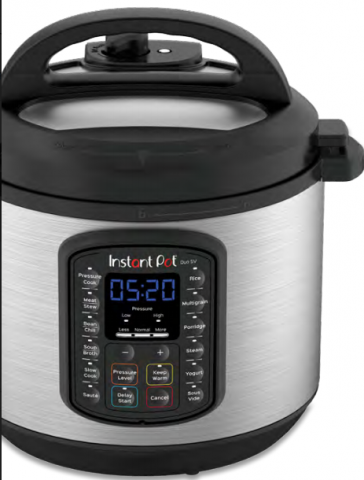IMPORTANT SAFEGUARDS
Read this manual carefully and completely, and retain for future reference. WARNING Failure to adhere to safety instructions may result in serious injury or damage.
When using electrical appliances, basic safety precautions should always be followed:
1. READ THE GETTING STARTED GUIDE AND ALL INSTRUCTIONS, SAFEGUARDS, AND WARNINGS BEFORE OPERATING THE APPLIANCE. FAILURE TO FOLLOW THESE SAFEGUARDS AND INSTRUCTIONS MAY RESULT IN INJURY AND/OR PROPERTY DAMAGE.
2. Use only the Instant Pot Duo SV lid with the Instant Pot Duo SV pressure cooker base. Using any other pressure cooker lids may cause injury and/or damage.
3. To reduce the risk of pressure leakage, cook only in an authorized stainless steel Instant Pot inner pot. DO NOT use the appliance without the removable inner pot installed.
4. Always operate the appliance on a stable, non-combustible, level surface.
5. Do not use the appliance for anything other than its intended use. Failure to follow these instructions may result in injury or property damage.
6. For household use only. Do not use outdoors. Not for commercial use.
7. CAUTION Do not place the appliance on or in close proximity to a hot gas or electric burner, or a heated oven. Heat from an external source will damage the appliance. Failure to follow these instructions may result in injury or property damage.
8. CAUTION Do not use the appliance near water or flame. Keep out of direct sunlight. Failure to follow these instructions may result in injury or property damage.
9. CAUTION Do not touch hot surfaces. Only use side handles for carrying or moving. Extreme caution must be used when moving the appliance containing hot liquids. Do not move the appliance when it is under pressure.
10. The cooker base contains electrical components. To avoid electrical shock, do not put liquid of any kind into cooker base , and do not immerse power cord, plug, or the appliance in water or other liquid. Do not rinse the appliance under tap.
11. CAUTION Do not fill over PC MAX — 2/3 as indicated on the inner pot. When cooking foods that expand during cooking such as rice or dried vegetables, do not fill the inner pot over —1/2 line. Overfilling may cause a risk of clogging the steam release pipe and developing excess pressure.
12. WARNING This appliance cooks under pressure. Inappropriate use may result in burns, injury and/or property damage. Make certain the appliance is properly closed before operating. Refer to Pressure Control Features – Pressure Cooking Lid.
13. When cooking meat with skin (e.g. sausage with casing), the skin can swell when heated. Do not pierce the skin while it is swollen; this could result in scalding injury.
14. CAUTION When pressure cooking food with a doughy or thick texture, or a high fat/oil content, contents may splatter when opening the lid. Please follow recipe instructions for pressure release method. Refer to Depressurizing the Cooker (Venting Methods).
15. CAUTION Before each use, check the steam release valve/handle, steam release pipe, anti-block shield and float valve for clogging. Failure to do so may result in injury or property damage.
16. DANGER Do not open the appliance until it has depressurized and all internal pressure has been released. If the float valve is still up and/or the lid is difficult to open, this indicates that the appliance is still pressurized — do not force it open. Any pressure in the appliance can be hazardous. Refer to Depressurizing the Cooker (Venting Methods) for information on releasing pressure. Opening appliance while it is still pressurized may lead to sudden release of hot contents and may cause burns or other injuries.
17. Do not use this appliance for deep frying or pressure frying with oil.
18. Do not lean over or place your hands or face over the steam release valve/ handle or float valve when the appliance is in operation or has residual pressure. Do not touch the metal portion of the lid when the appliance is in operation; this could result in injury.
19. Do not cover or obstruct the steam release valve/handle and/or float valve with cloth or other objects. Obstructing the steam release valve/handle and/or float valve can create a safety issue and may cause injury.
20. Turn the appliance off if steam escapes from the steam release valve/handle and/or float valve in a steady stream for longer than 3 minutes. There may be residual pressure in the appliance. Allow the appliance to depressurize naturally or release all excess pressure before opening. For more information on how to release pressure, refer to Depressurizing the Cooker (Venting Methods).
21. Turn the appliance off if steam escapes from the sides of the lid and ensure sealing ring is properly installed. Overview of Pressure Control Features – Sealing Ring for more information.
22. To disconnect, select Cancel, then remove plug from power source.
23. Unplug from the outlet when not in use, as well as before adding or removing parts or accessories, and before cleaning. To unplug, grasp the plug and pull from the outlet. Never pull from the power cord.
24. Regularly inspect the appliance and power cord. Do not operate the appliance if the power cord or plug is damaged, or after the appliance malfunctions or is dropped or damaged in any manner. For assistance, contact Customer Care at support@instantpot.com or 1-800-828-7280.
25. CAUTION Do not let the power cord hang over edges of tables or counters, or touch hot surfaces or open flame, including the stovetop.
26. CAUTION Spilled food can cause serious burns. A short power-supply cord is provided to reduce the hazards resulting from grabbing, entanglement and tripping.
• Keep the appliance and cord away from children.
• Never drape the power cord over edges of tables or counters. • Never use below-counter power outlets, and never use with an extension cord.
27. Intended for countertop use only. Keep the appliance on a stable, heat resistant platform. Do not place on anything that may block the vents on the bottom of the appliance. Do not place on a hot stove.
28. CAUTION Do not use any accessories or attachments not authorized by Instant Brands™ Inc. The use of attachments not recommended by the manufacturer, may cause a risk of injury, fire or electric shock.
29. CAUTION Before inserting the inner pot into the appliance, clean the outer surface of the inner pot and the heating element located on the inner surface of the outer pot with a clean, dry cloth. Ensure they are dry and free of food debris.
30. Do not attempt to repair, replace, or modify components of the appliance, as this may cause electric shock, fire or injury, and will void the warranty.
31. Do not tamper with any of the safety mechanisms, as this may result in injury or property damage.
32. Do not use the appliance in electrical systems other than 120 V/60 Hz for North America. Do not use with power converters or adapters.
33. This appliance is NOT to be used by children or by persons with reduced physical, sensory, or mental capabilities. Close supervision is necessary when any appliance is used near children and these individuals. Children should not play with this appliance.
34. To prevent personal injury and damage to the appliance, only replace the sealing ring with an authorized Instant Pot sealing ring.
35. The use of accessory attachments not recommended by the appliance manufacturer may cause injuries.
36. Proper maintenance is recommended after each use. Refer to Care and Cleaning. Let the appliance cool to room temperature before cleaning or storage.
37. Never connect this appliance to an external timer switch or separate remote control system.
38. CAUTION DO NOT touch accessories during or immediately after cooking. To avoid personal injury,
• Always use oven mitts when removing accessories, and to handle the inner pot.
• Always place hot accessories on a heat resistant surface or cooking plate.
• Use extreme caution when disposing of hot grease.
Failure to follow these instructions may result in serious injury or property damage.
39. Do not leave the appliance unattended while in use.
40. CAUTION Extreme caution must be used when the inner pot contains hot oil, hot food, or hot liquids. Improper use, including moving the cooker base, may result in personal injury. Do not move the appliance while it is in use.
41. Oversized foods and/or metal utensils must not be inserted into the inner pot as they may cause risk of fire and/or personal injury.
42. Do not store any materials in the cooker base or inner pot when not in use.
43. Do not place any combustible materials in the cooker base or inner pot, such as paper, cardboard, plastic, Styrofoam or wood.
44. Do not use the included accessories in a microwave, toaster oven, convection or conventional oven, or on a ceramic cooktop, electric coil, gas range, or outdoor grill.
45. The removable inner pot can be extremely heavy when full of ingredients. Care should be taken when lifting the inner pot from the cooker base to avoid burn injury.
46. Use caution when removing the lid. Heat and steam escapes as soon as the lid is removed. Never place your face, hands or exposed skin over the appliance opening where heat and steam escapes when removing the lid.
SAVE THESE INSTRUCTIONS
| WARNING |
| To avoid injury, read and understand instruction manual before using this machine. |
| WARNING |
| Electrical shock hazard. Use grounded outlet only. DO NOT remove ground. DO NOT use an adapter. DO NOT use an extension cord. Failure to follow instructions can cause death and/or electrical shock. |
| WARNING |
| THE FAILURE TO FOLLOW ANY OF THE IMPORTANT SAFEGUARDS AND THE IMPORTANT INSTRUCTIONS FOR SAFE USE IS A MISUSE OF YOUR APPLIANCE THAT CAN VOID YOUR WARRANTY AND CREATE THE RISK OF SERIOUS INJURY. |
Special Cord Set Instructions
As per safety requirement, a short power supply cord (0.6 m to 0.9 m / 24” to 35”) is provided to reduce the hazards resulting from entanglement and tripping.
This appliance has a 3-prong grounding plug. To reduce the risk of electric shock, plug the power cord into a grounded (earthed) electrical outlet that is easily accessible.
Product Specifications

Initial Setup
• Read all the Important Safeguards before using the appliance. Failure to read and follow the Important Safeguards may result in damage to the appliance, property damage or personal injury.
• Use only the Instant Pot Duo SV lid with the Instant Pot Duo SV pressure cooker base. Using any other pressure cooker lids may cause injury and/or damage. • Remove all packaging material and accessories from within and around the appliance.
• Place the appliance on a stable, level surface, away from combustible material and external heat sources.
• Do not remove safety warning stickers from lid or rating label from back of cooker base.
• Follow Care and Cleaning instructions to clean the appliance before first use.
| CAUTION | |
| Do not place the appliance on a stovetop. Heat from an external source will damage the appliance. | Do not place anything on top of the appliance, and do not cover or block the steam release valve or anti-block shield located on the appliance lid. |
Product, Parts and Accessories
Duo SV 6 Quart Pressure Cooker
Before using the Instant Pot Duo SV, verify that all parts are accounted for.
Top of Lid
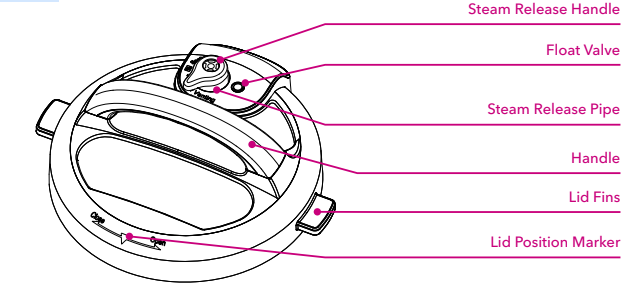
Illustrations are for reference only and may differ from the actual product.
Instant Tip: The lid has been designed with lid fins that fit perfectly inside the handles on the left and right sides of the cooker base to help keep your countertop dry!
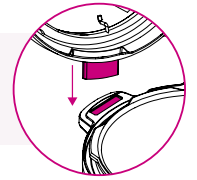
Bottom of Lid
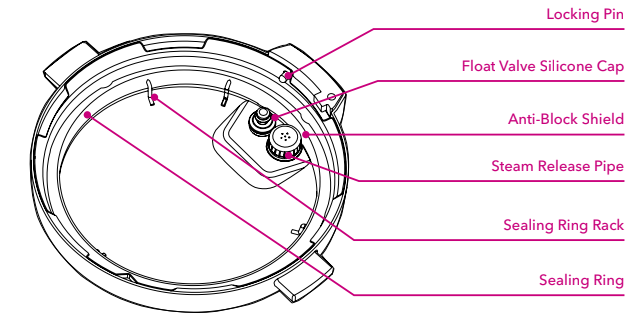
Inner Pot
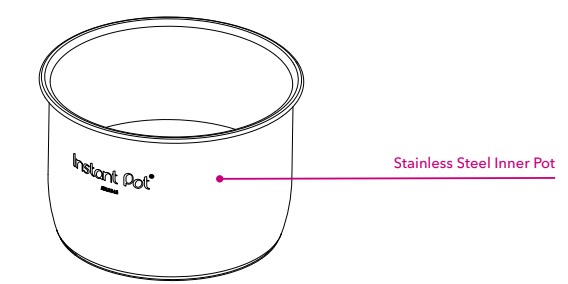
Cooker Base
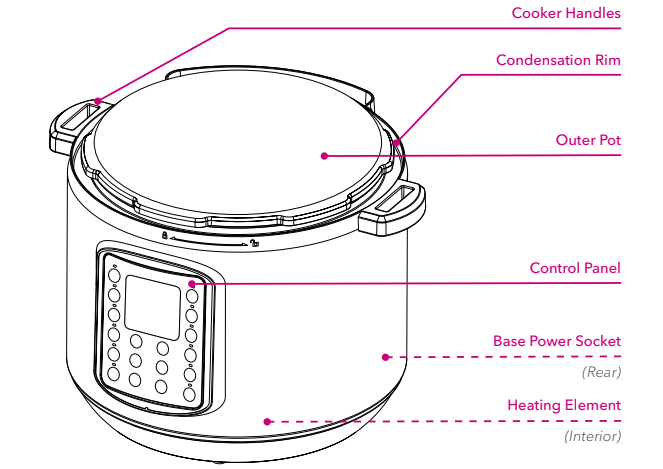
Accessories
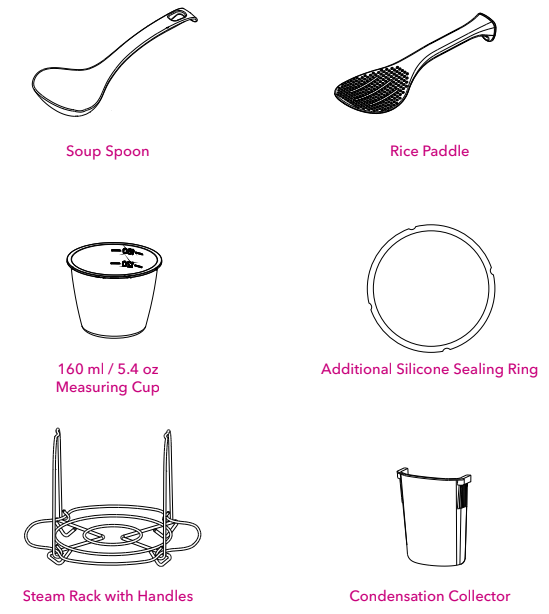
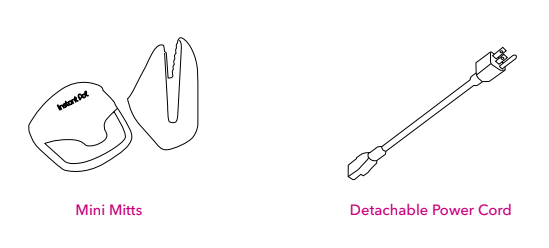
Control Panel
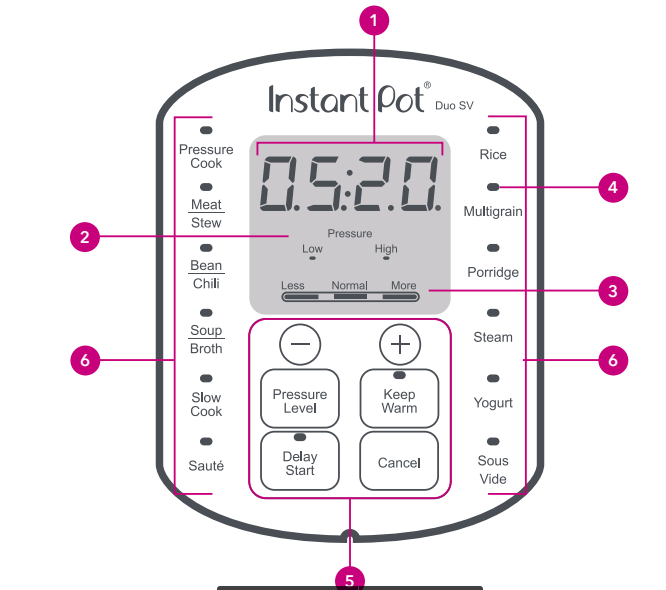
1 Time Display
Countdown timer indicates cooking and Delay Start time in hour format: 05:20 is 5 hours, 20 minutes.
Keep Warm timer counts up.
Display also indicates Status Messages.
2 Pressure Field
Indicators illuminate to indicate Low or High pressure level.
3 Less – Normal – More
Pressure cooking: 3 preset time options.
Non-Pressure cooking: 3 temperature levels.
4 LED Indicators
Illuminate to indicate the active Smart Program and settings selected.
5 Smart Program Settings
Pressure Level
Keep Warm
− / + buttons
Delay Start
Cancel
See Smart Program Settings for more information.
6 Smart Programs
Pressure Cooking:
• Pressure Cook
• Meat/Stew
• Bean/Chili
• Soup/Broth
• Rice
• Multigrain
• Porridge
• Steam
Non-Pressure Cooking:
• Slow Cook
• Sauté
• Yogurt
• Sous Vide
• Keep Warm
Smart Program Settings
Adjust and Save Pressure Cooking Temperature
Select a pressure cooking Smart Program, then press Pressure Level to toggle between High (10.2 – 11.6 psi) and Low (5.8 – 7.2 psi) pressure levels.
Note: A higher pressure results in higher cooking temperature.
When cooking begins, the pressure level you selected is saved and remembered the next time the Smart Program is selected.
The cooking temperature may be adjusted at any time during pressure cooking by pressing Pressure Level, but adjustments made after cooking has begun will not be saved.
Adjust and Save Pressure Cooking Time
Select a pressure cooking Smart Program, then press the Smart Program button again to cycle through the Less, Normal and More cooking time options.
If desired, use the − / + buttons to further customize the time.
When cooking begins, your customizations are saved and remembered the next time the Smart Program is selected.
The cooking time may be adjusted at any time during pressure cooking, but adjustments made after cooking has begun will not be saved.
Adjust and Save Non-Pressure Cooking Temperatures
Select a non-pressure cooking Smart Program, then press the Smart Program button again to cycle through the Less, Normal and More cooking temperature levels.
When cooking begins, the temperature level is saved and remembered the next time the Smart Program is selected.
The cooking temperature may be adjusted at any time during non-pressure cooking by pressing the Smart Program button, but adjustments made after cooking has begun will not be saved.
Adjust and Save Non-Pressure Cooking Time
Select a non-pressure cooking Smart Program, then use the − / + buttons to adjust the cooking time.
The cooking time may be adjusted at any time during non-pressure cooking, but adjustments made after cooking has begun will not be saved.
Cancel and Standby Mode
When the cooker is plugged in but not in operation, the display reads OFF to indicate Standby mode.
Press Cancel to stop a Smart Program at any time. The cooker returns to Standby mode.
Turn Sound On/Off
Sound On: When in Standby, press and hold + button until display indicates S On.
Sound Off: When in Standby, press and hold − button until display indicates SOFF. Note: Audible safety alerts (beeps) cannot be turned off.
Adjust Temperature Scale: Fahrenheit and Celsius
Press and hold − and + buttons together for 5 seconds to toggle between °F and °C. Note: Temperature is only displayed within the Sous Vide Smart Program.
Set a Delay Start Timer
Delay Start can be set to a minimum of 10 minutes or a maximum of 24 hours.
1. Select a Smart Program and adjust the settings as you desire, then press Delay Start.
Note: Once Delay Start has been selected, there is no way to return to the cooking settings. To adjust Smart Program settings, press Cancel and enter new selections.
2. When the hours field flashes, use the − / + buttons to adjust the delay time. E.g., 02:00 indicates that cooking will start after 2 hours.
3. Press Delay Start again to toggle to the minutes field and follow the same process as the previous step.
4. Delay Start begins automatically after 10 seconds and the timer counts down.
5. When Delay Start ends, the Smart Program begins, and the display indicates On. Delay Start is not available with the Sauté, Sous Vide or Yogurt Smart Programs.
Automatically Keep Food Warm After Cooking
The Keep Warm setting turns on automatically after cooking on all Smart Programs except Sauté, Sous Vide and Yogurt.
When automatic warming begins, the timer begins counting from 00:00 to indicate the time passed, up to 10 hours.
To turn automatic warming off, press Keep Warm. The LED above the button dims to indicate that it is off.
Reheat Food or Keep Warm for Long Periods
When in Standby, select Keep Warm. Press Keep Warm again to cycle through Less, Normal and More warming temperature levels.
Use the − / + buttons to set a warming timer up to 99 hours and 50 minutes. Keep Warm begins automatically after 10 seconds.
When Keep Warm completes, the display indicates End.
Reset Smart Programs to Factory Default Settings
Reset Individual Smart Programs
With the cooker in Standby mode, press and hold one Smart Program button until the cooker returns to Standby and displays OFF.
The Smart Program’s pressure level, cooking time and temperature are restored to the factory default setting.
Reset All Smart Programs
With the cooker in Standby mode, press and hold Cancel until the cooker beeps.
All Smart Program pressure levels, cooking times and temperatures are restored to the factory default setting.
Status Messages




• When a Smart Program is running, the display timer counts down to indicate the cooking time remaining in the Smart
Program.
• When Delay Start is running, the display timer counts down until the Smart Program begins.
• When Keep Warm is running, the display timer counts up to indicate how long food has been warming.


cycle (i.e., the Yogurt Smart Program is set to More).


is off.

Troubleshooting.

Cleaning Before First Use
Remove the inner pot from the cooker base and wash it with hot water and dish soap. Rinse with warm, clear water and use a soft cloth to dry the outside of the inner pot.
Note: The inner pot is dishwasher safe.
Wipe the heating element with a soft cloth to ensure there are no stray packaging particles present before returning the inner pot to the cooker base.
Note: Before cooking, always ensure the heating element is clean and dry before inserting the inner pot into the cooker base. Failure to do so may damage the cooker.
The inner pot is an integral part of product safety. Food must be placed in the inner pot, and never directly in the cooker base.
To avoid personal injury or damage to the appliance, replace a deformed or damaged inner pot. Use only authorized Instant Pot inner pots made for this model when cooking.
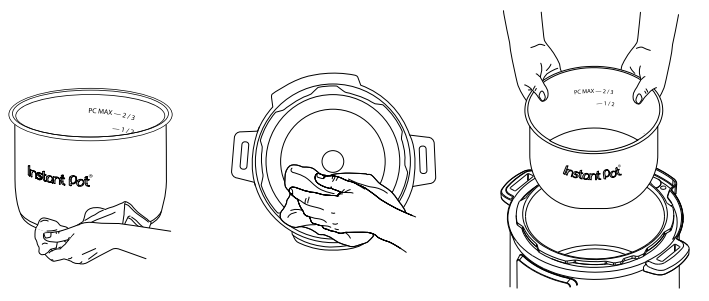
CAUTION To avoid risk of personal injury and/or property damage, as well as damage to the cooker, do not pour food or liquid into cooker base.
WARNING Do not fill the inner pot higher than the PC MAX — 2/3 (Pressure Cooking Maxi mum), as indicated on the inner pot.
Exercise extreme caution when cooking and venting food such as applesauce, cranberries, pearl barley, oatmeal, split peas, noodles, etc., as these foods may foam, froth, or spatter, and may clog the steam release pipe and/or steam release valve. Do not fill the inner pot higher than the —1/2 line when cooking these foods.
Overview of Pressure Control Features
Pressure Cooking Lid
The stainless steel lid included is necessary for most cooking processes, and is essential for pressure cooking. Always ensure to use the Duo SV pressure cooking lid with the Duo SV cooker base.
For replacement parts and accessories, visit our store.
When plugged in, the cooker plays a jingle when the lid is opened and closed.
Open and Remove the Lid
Grip the lid handle and turn it counter-clockwise to align the symbol on the lid with the symbol on the rim of the cooker base, then lift the lid up and off the cooker base.
Close the Lid
Align the symbol on the lid with the symbol on the cooker base, and lower the lid onto the track. Turn the lid clockwise until the symbol on the lid aligns with the symbol on the cooker base.
The pressure cooking lid does not lock when closed. The lid is removable until the cooker pressurizes.
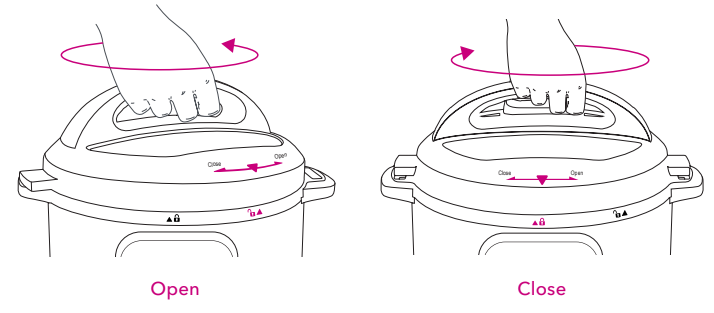
CAUTION Always check the lid for damage and excessive wear prior to cooking.
WARNING The Duo SV pressure cooking lid is not compatible with other Instant Pot pressure cookers. Always ensure to use the Duo SV pressure cooking lid with the Duo SV cooker base when pressure cooking. Using any other pressure cooker lid may cause injury and/or property damage.
Steam Release Handle
Turning the handle from Sealing to Venting and vice versa manually opens and closes the steam release valve, sealing and venting the cooker as you desire.
When the cooker releases pressure, steam ejects from the top of the steam release handle.
Refer to Depressurizing the Cooker (Venting Methods) for details on safe depressurization.
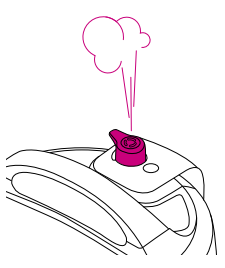
The steam release handle is integral to product safety and necessary for pressure cooking. It should be installed before use and cleaned regularly.
Remove the Steam Release Handle
Pull steam release handle up and off steam release pipe.
Steam release handle must be installed before use and cleaned frequently
Install the Steam Release Valve
Place the steam release handle on the steam release pipe and press down firmly.
The steam release handle sits loosely on the steam release pipe in order to pivot easily while the cooker is pressurized. It should remain in place when the lid is turned over.
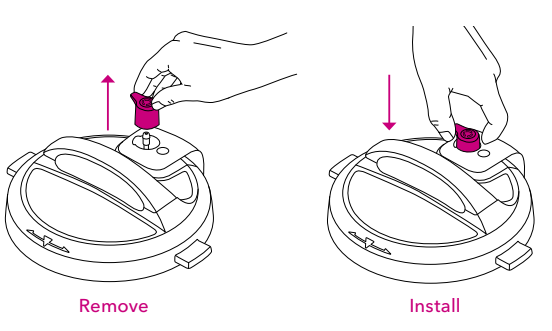
WARNING Do not cover or block the steam release valve.
Anti-Block Shield
The anti-block shield prevents food particles from coming up through the steam release pipe, assisting with pressure regulation.
As an integral part of product safety, the anti-block shield must be installed before use and cleaned frequently.
Remove the Anti-Block Shield
Grip the lid like a steering wheel and use your thumbs to press firmly against the side of the anti-block shield (pressing towards the side of the lid and up) until it pops off the prongs underneath.
Install the Anti-Block Shield
Place anti-block shield over prongs and press down until it snaps into position.
Do not attempt to operate the pressure cooker without the anti-block shield installed.
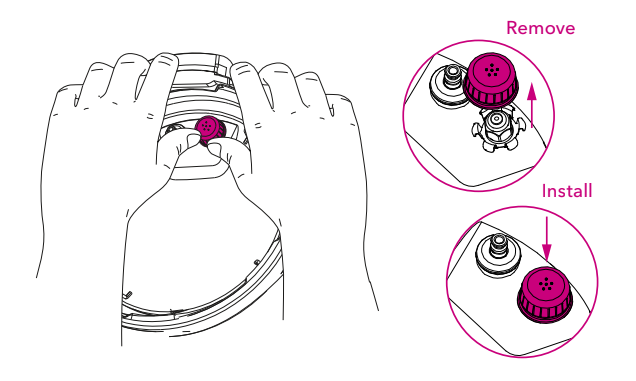
Sealing Ring
When the pressure cooking lid is closed, the sealing ring installed on the underside of the lid creates an air-tight seal between the lid and the cooker base.
The sealing ring must be installed before using the cooker and should be cleaned after each use. Only 1 sealing ring should be installed in the lid when
using the cooker. Use one for sweet dishes and one for savory.
Sealing rings stretch over time with normal use. As an integral part of product safety, the sealing ring should be replaced every 12–18 months or sooner if
stretching, deformation, or damage is noticed.
Remove the Sealing Ring
Grip the edge of the silicone and pull the sealing ring out from behind the circular stainless steel sealing ring rack.
With the sealing ring removed, inspect the rack to ensure it is secured, centered, and an even height all the way around the lid. Do not attempt to repair a
deformed sealing ring rack.
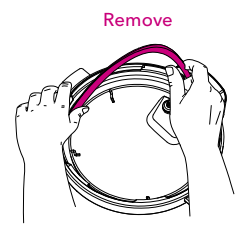
Install the Sealing Ring
Place the sealing ring over the sealing ring rack and press it into place. Press down firmly to alleviate puckering.
When installed properly, the sealing ring is snug behind sealing ring rack and should not fall out when the lid is turned over.
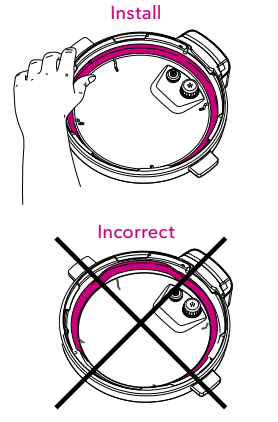
Instant Tip: Silicone is porous, so it may absorb strong aromas and certain flavors. Keep extra sealing rings on hand to limit the transfer of those aromas
and flavors between dishes. Visit our store to color code your cooking.
CAUTION: Always check for cuts, deformation, and correct installation of the sealing ring prior to cooking. Do not use a stretched or damaged sealing ring. Only use authorized Instant Pot sealing rings. Failure to follow these instructions may cause food to discharge, which may lead to personal injury or property damage.
Float Valve
The float valve provides a visual indication of pressure within the cooker and appears in 2 positions.
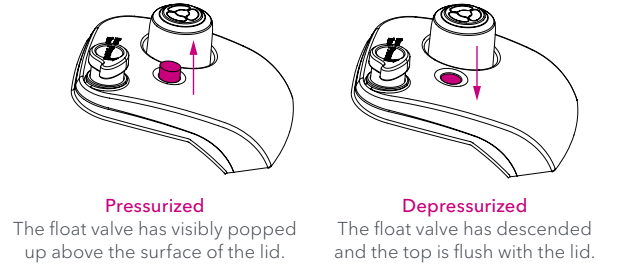
The float valve and silicone cap work together to seal in pressurized steam. These parts must be installed before use and should be cleaned after each use.
Remove the Float Valve from the Lid
Place one finger on the flat top of float valve, then turn the lid over. Detach the silicone cap from the bottom side of the float valve.
Remove the float valve from the top of the lid. Do not discard the float valve or silicone cap.
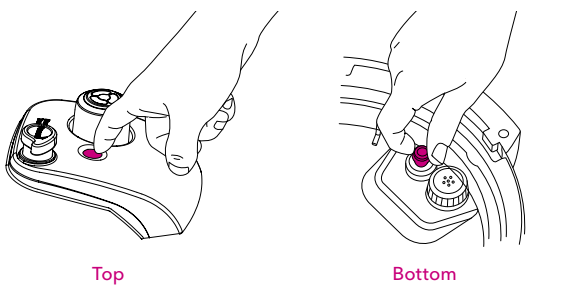
Install the Float Valve
Drop the narrow end of the float valve into the float valve hole on the top of the lid. Place one finger on the flat top of the float valve, then turn the lid over. Firmly attach the silicone cap to the bottom of the float valve.
Do not attempt to operate the pressure cooker without the float valve and/or silicone cap properly installed in the pressure cooking lid.
DANGER: While the float valve is up, contents of cooker are under extreme pressure. Do not attempt to remove the lid. All pressure must be released, and float valve must be down. Refer to Depressurizing the Cooker (Venting Methods) for information on releasing pressure. Failure to follow these instructions may result in property damage and/or personal injury.
Condensation Collector
The condensation collector sits at the back of the cooker base and accumulates overflow moisture from the condensation rim. It should be installed before
cooking, then emptied and rinsed out after each use.
Remove the Condensation Collector
Pull the condensation collector away from the cooker base; do not pull down. Note the tabs on the cooker base and the grooves on the condensation collector.
Install the Condensation Collector
Align the grooves on the condensation collector over the tabs on the back of the cooker base and slide the condensation collector into place.

Pressure Cooking with the Duo SV
Introduction to Pressure Cooking
Pressure cooking uses steam pressure to raise the boiling point of water above 100oC / 212oF. This energy-efficient cooking method is the fastest way to
thoroughly cook a variety of your favorite meals.
Pressure cookers go through 3 stages when pressure cooking:
1.Pre-Heating and Pressurization
The cooker waits 10 seconds to ensure you have finished inputting your selections, then displays On to indicate it has begun pre-heating. While the cooker pre-heats, it vaporizes liquid in the inner pot to create steam. Once enough steam has built up inside the inner pot, the float valve pops up and locks the lid of the cooker in place for safe pressure cooking.
When the float valve pops up, the silicone cap attached to the bottom of the float valve (on the underside of the lid) seals the steam inside the cooking chamber (the inner pot) and allows the pressure to rise even higher. A higher pressure means a higher cooking temperature.
While it is normal to see some steam escaping through the float valve during Pre-Heating, if you see steam escaping from around the sides of the lid, press
Cancel and refer to Troubleshooting.
Note: The time it takes your cooker to pressurize is determined by a variety of factors, including food and liquid volume.
2.Cooking
After the float valve pops up, the cooker needs a few minutes to finish building pressure. When the required pressure level is reached, cooking begins. The
display switches from On to the cooking countdown timer, displayed in HH:MM (hours : minutes) format.
Smart Program settings (e.g., cooking time, temperature and/or pressure level, and whether Keep Warm will come on automatically or not) can be adjusted at any time during cooking. Refer to Smart Program Settings for details.
3.Depressurization
After pressure cooking completes, follow your recipe instructions for depressurizing the cooker.
If automatic Keep Warm is on after cooking completes, the timer counts up from 00:00 to indicate the elapsed time up to 10 hours. If not, the cooker returns to
Standby and displays End.
Note: The cooker cools and depressurizes faster if automatic Keep Warm is off.
See Depressurizing the Cooker (Venting Methods) for information on releasing pressure after cooking.
DANGER: While the float valve is up, contents of cooker are under extreme pressure. Do not attempt to remove the lid while the float valve is still up. All pressure must be released, and float valve must be down before attempting to remove the lid. Never attempt to force the lid open. Failure to follow the instructions may result in property damage and/or personal injury.
Depressurizing the Cooker (Venting Methods)
Always follow recipe instructions for depressurizing the cooker.
Venting Methods
Once cooking completes, there are several methods to release pressure:
Natural Release (NR)
Leave the quick release button in the popped-up Seal position. As the temperature within the cooker drops, the cooker depressurizes naturally over time.
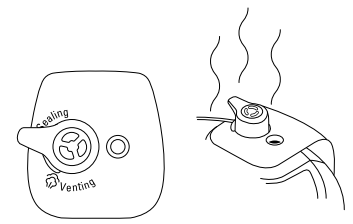
Depressurization time varies based upon the volume and type of food and liquid. When the cooker has completely depressurized, the float valve drops into the lid.
NOTICE: Use NR to depressurize the cooker after cooking high-starch foods (e.g., soups, stews, chilis, pasta, oatmeal and congee) or after cooking foods that expand when cooked (e.g., beans and grains).
Quick Release (QR)
Quickly and carefully turn the steam release handle from the Sealing position to the Venting position.
Use the handle as indicated in the illustration and do not put your hand over the top as it could come in contact with the steam.
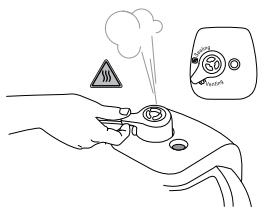
A stream of steam releases through the top of the steam release handle.
Note: Steam may range in opacity but is always loud!
If continuous spatter occurs, turn the steam release handle back to the Sealing position and try again after a few minutes. If spatter continues, use NR to vent the remaining pressure.
NOTICE Do not use QR when cooking high-starch foods (e.g., stews, chilis, pasta and congee) or when cooking foods that expand when cooked (e.g., beans and grains).
10-Minute NR
Leave the steam release handle in the Sealing position for 10 minutes after cooking has completed, then turn the steam release handle to the Venting position.
A stream of steam releases through the top of the steam release handle.
If continuous spatter occurs, turn the steam release handle back to the Sealing position and try again after a few minutes.
If spatter continues, use NR to vent the remaining pressure.
DANGER While the float valve is up, contents of cooker are under extreme pressure. Do not attempt to remove the lid while the float valve is still up. All pressure must be released, and float valve must be down before attempting to remove the lid. Never attempt to force the lid open. Failure to follow the instructions may result in property damage and/or personal injury.
| WARNING | ||
| Do not lean over or touch the steam release valve. | Do not place unprotected skin over the steam release valve. | Do not cover or obstruct the steam release valve. |
Initial Test Run (Water Test)
Follow these steps to familiarize yourself with your Instant Pot Duo SV. Total test time: Approximately 20 minutes.
1. Remove the inner pot from the cooker base.
2. Add 3 cups (24 oz / 750 mL) of water to the inner pot.
3. Insert the inner pot into the cooker base.
4. Secure the power cord to the base power socket at the back of the cooker base. Ensure the connection is tight.
Connect the power cord to a 120 V power source.
The display indicates OFF.
5. Place and close the lid as described in Pressure Control Features – Pressure Locking Lid.
6. Turn the steam release handle to the Sealing position.
7. Press Pressure Cook to select the Pressure Cook Smart Program. 8. Use the − / + buttons to adjust the cooking time to 00:05 minutes.
Note: The Instant Pot will save this customization.
9. Press Keep Warm to deactivate the automatic Keep Warm setting. After 10 seconds, the display reads On to indicate that the Pre-heating cycle has begun.
10. The float valve rises when the cooker has pressurized.
After a few minutes the cooker reaches the target pressure level and Cooking begins.
The display changes from On to the cook time countdown.
11. When the Smart Program is complete, the display indicates End. 12. Turn the steam release handle to Venting. Pressurized steam releases through the top of the steam release valve.
13. The float valve drops when the pressure has been fully released. 14. Open and remove the lid as described in Pressure Control Features – Pressure Locking Lid.
15. Carefully remove the inner pot from the cooker base, discard the water and thoroughly dry the inner pot.
You’re ready to start cooking!
CAUTION The inner pot will be hot after cooking. Always use appropriate heat protection when handling a hot inner pot.
Using Pressure Cooking Smart Programs
Whether you are a novice cook or a culinary expert, the Duo SV provides Smart Programs to get you cooking with the touch of a button.
The steps below follow the safest procedure for using the cooker and can be applied to the following Smart Programs: Meat/Stew, Bean/Chili, Soup/Broth, Rice, Multigrain, Porridge and Steam.
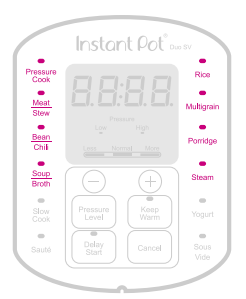
Always inspect your Instant Pot pressure cooking lid, inner pot and cooker base carefully to ensure they are clean and in good working condition before use.
| Instant Pot Size | Minimum Liquid for Pressure Cooking* |
| 6 Quarts / 5.7 Litres | 1 ½ cups (12 oz / 375 mL) |
*Unless otherwise specified in recipe.
Pressure cooking liquids should be water-based, such as broth, stock, soup or juice. If using canned, condensed, or cream-based soup, add water as directed above
CAUTION To avoid scorching or scalding injury, be cautious when cooking with more than 1/4 cup (2 oz / 60 mL) oil, oil-based sauces, condensed cream-based soups, and thick sauces. Add suitable liquid to thin sauces. Avoid recipes that call for more than 1/4 cup (2 oz / 60 mL) of oil or fat content.
1. Open and remove the lid as described in Pressure Control Features – Pressure Locking Lid.
2. Remove inner pot from cooker base.
3. Add food and liquid to the inner pot and insert back into the cooker base.
Note: Cold or frozen food items take longer to generate steam and slow down pressurization. For the fastest results, thaw frozen ingredients before cooking.
4. Insert the inner pot into the cooker base.
5. Secure the power cord to the base power socket at the back of the cooker base. Ensure the connection is tight.
Connect the power cord to a 120 V power source. The cooker goes to Standby mode and the display indicates OFF.
6. Place and close the lid as described in Pressure Control Features – Pressure Locking Lid.
7. Turn the steam release handle to the Sealing position.
8. Select your desired pressure cooking Smart Program.
9. Press the same Smart Program button again to cycle through Less, Normal and More time options.
10. For custom cooking, use the − / + buttons to adjust the cooking time. 11. Press Pressure Level to toggle between Low and High pressure.
Note: When pressure cooking, the pressure level controls the temperature. A higher pressure results in a higher cooking temperature.
Note: Cooking time and pressure level adjustments are saved to the Smart Program when cooking begins.
12. Press Keep Warm to toggle the automatic Keep Warm setting off and on. 13. After 10 seconds, the display reads On to indicate that Pre-heating has begun. 14. When cooking completes, follow recipe directions to select the appropriate venting method. Refer to Depressurizing the Cooker (Venting Methods).
Instant Tip: Use the steam rack to lift foods out of the cooking liquid. This ensures even heat distribution, prevents nutrients from leeching into the cooking liquid, and stops food items from scorching on the bottom of the inner pot.
DANGER While the float valve is up, contents of cooker are under extreme pressure. Do not
attempt to remove the lid while the float valve is still up. All pressure must be released, and float valve must be down before attempting to remove the lid. Never attempt to force the lid open. Failure to follow the instructions may result in
property damage and/or personal injury.
| WARNING | |
| Do not fill inner pot higher than the PC MAX — 2/3 line as indicated on the inner pot. When cooking foods that expand (e.g.; rice, beans, pasta) do not fill the inner pot higher than the — 1/2 line as indicated on the inner pot. | Always cook with the inner pot in place. Do not pour food or liquid into the cooker base. To avoid risk of personal injury and/or property damage, place food and liquid ingredients in the inner pot, then insert the inner pot into the cooker base. |
Pressure Cooking Settings

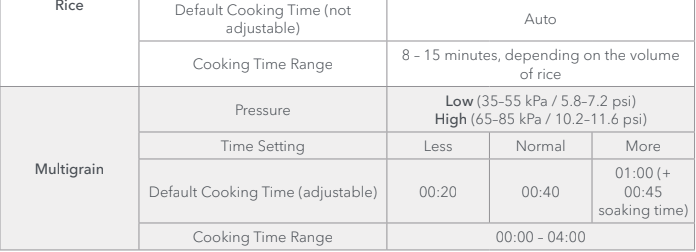
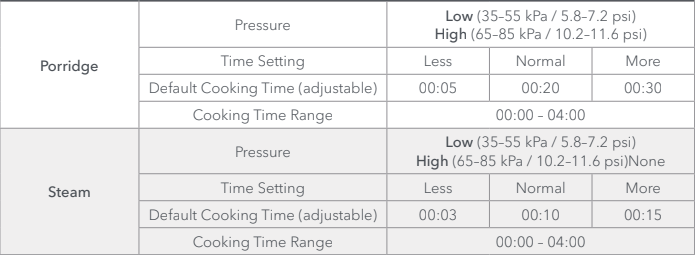
Pressure Cooking Tips
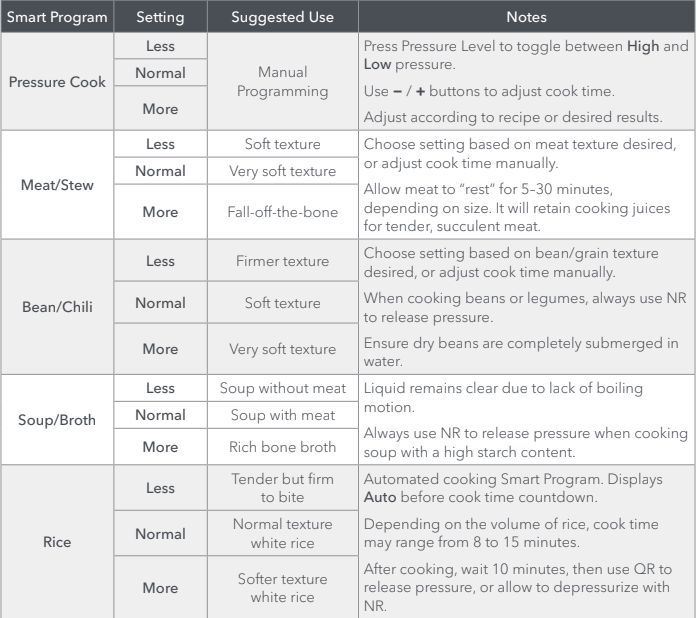

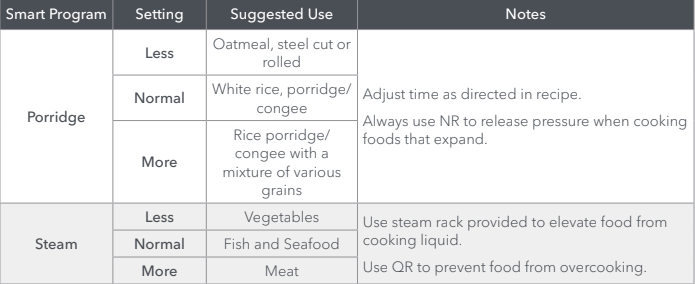
CAUTION Always use a meat thermometer to ensure the internal temperature reaches a safe minimum temperature. Refer to the USDA’s Safe Minimum Internal Temperature Chart for more information.
Pressure Cooking Timetable
The following are recommendations only. Always follow a trusted recipe.
| Food | Time | |
| Vegetables | ||
| Asparagus, Beans (Yellow and Green), Broccoli | 1–2 minutes | |
| Brussels Sprouts, Cabbage (Whole or Wedges), Cauliflower (Florets) | 2–3 minutes | |
| Butternut Squash | 4–6 minutes | |
| Carrots (Whole or Chunks) | 6–8 minutes | |
| Corn (on the Cob) | 3–5 minutes | |
| Potatoes (Large, Whole) | 12–15 minutes | |
| Potatoes (Small, Whole) | 8–10 minutes | |
| Potatoes (Cubed) | 3–4 minutes | |
| Sweet Potatoes (Whole) | 12–15 minutes | |
| Sweet Potatoes (Cubed) | 2–4 minutes | |
| Meat and Eggs | ||
| Beef (Stew) | 20 minutes (per 450 g / 1 lb) | |
| Beef (Large Pieces), Beef (Ribs) | 20–25 minutes (per 450 g / 1 lb) | |
| Chicken (Breasts) | 6–8 minutes (per 450 g / 1 lb) | |
| Chicken (Whole) | 8 minutes (per 450 g / 1 lb) | |
| Chicken (Bone Stock) | 40–50 minutes | |
| Lamb (Leg), Pork (Butt Roast) | 15 minutes (per 450 g / 1 lb) | |
| Pork (Baby Back Ribs) | 15–20 minutes (per 450 g / 1 lb) | |
| Eggs | Hard: 5 mins | |
| Beans and Lentils (Dry and Soaked) | ||
| Black Beans | D: 20–25 mins / S: 6–8 mins | |
| Black-Eyed Peas | D: 14–18 mins / S: 4–5 mins | |
| Chickpeas | D: 35–40 mins / S: 10–15 mins | |
| Kidney Beans (Red), Navy Beans | D: 20–25 mins / S: 7–8 mins | |
| Kidney Beans (White), Pinto Beans | D: 25–30 mins / S: 6–9 mins | |
| Lentils (Green) | D: 8–10 mins / S: N/A | |
| Lentils (Yellow) | D: 1–2 mins / S: N/A | |
| Lima Beans | D: 12–14 mins / S: 6–10 mins | |
| Soybeans | D: 35–45 mins / S: 18–20 mins | |
| Seafood | ||
| Fish (Whole) | 4–5 minutes | |
| Fish (Fillet), Lobster | 2–3 minutes | |
| Mussels | 1–2 minutes | |
| Shrimp (Or Prawn) | 1–3 minutes | |
| Seafood Stock | 7–8 minutes |
Click here for a complete list of cooking timetables.
Grain-to-Water Ratios
CAUTION: Always use a meat thermometer to ensure the internal temperature reaches a safe minimum temperature. Refer to the USDA’s Safe Minimum Internal Temperature Chart for more information.
| Rice and Grain | Grain : Water Ratio |
| White or Brown Rice | 1 : 1 cup |
| Quinoa | 1 : 3/4 cup |
| Oatmeal | 1 : 3 cups |
| Risotto | 1 : 2 cups—add additional wine to taste |
| Porridge | 1 : 10 cups |
Using Non-Pressure Cooking Smart Programs
The Duo Nova SV is much more than a pressure cooker. These non-pressure cooking Smart Programs get you cooking quickly and easily.
The following sections provide the safest steps for using the cooker.
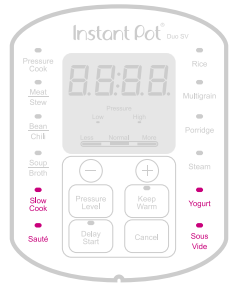
Always inspect your Instant Pot pressure cooking lid, inner pot and cooker base carefully to ensure they are clean and in good working condition before use.
| WARNING | |
| Do not fill inner pot higher than the PC MAX — 2/3 line as indicated on the inner pot. When cooking foods that expand (e.g., rice, beans, pasta) do not fill the inner pot higher than the — 1/2 line as indicated on the inner pot. | Always cook with the inner pot in place. Do not pour food or liquid into the cooker base. To avoid risk of personal injury and/or property damage, place food and liquid ingredients in the inner pot, then insert the inner pot into the cooker base. |
Slow Cook
Slow Cook is a non-pressure cooking program that is compatible for use with any common slow cooker recipe.
| Setting | Suggested Use | Notes |
| Less | Low setting on common slow cookers | F Follow recipe directions for slow cooking. Less is commonly used for low and slow, all-day cooking, and should be set for a minimum of 10:00 hours for best results. |
| Normal | Medium setting on common slow cookers | |
| More | High setting on common slow cookers |
- Remove the inner pot from the cooker base. Add food and liquid ingredients to the inner pot.
- Insert the inner pot into the cooker base.
- Mini and 6 Quart: Secure the power cord to the base power socket at the back of the cooker base. Ensure the connection is tight.
All: Connect the power cord to a 120 V power source. The cooker goes to Standby mode and the display indicates OFF. - Place and close the lid as described in Pressure Control Features—Pressure Locking Lid, or use a glass lid with a venting hole.
- Press the quick release button down until it clicks and locks into the Vent position.
- Press Slow Cook to select the Slow Cook Smart Program.
- Press Slow Cook again to cycle through the Less, Normal and More temperature options.
- Use the − / + buttons to adjust the cooking time.
Note: Cooking time and temperature level adjustments are saved to the Smart Program when cooking begins. - Press Keep Warm to toggle the automatic Keep Warm setting off and on.
- After 10 seconds, cooking begins and the display timer counts down.
- When cooking completes, the display indicates End if Keep Warm is turned off. If not, the timer begins counting from L0:00 up to 10 hours.
Note: The float valve should not rise during Slow Cook. The lid is removable throughout the cooking process for easy access. If the float valve rises, ensure the quick release button is set to the Vent position. Refer to Depressurizing Your Cooker (Venting Methods).
Sauté
Sauté is a non-pressure cooking program that can be used in place of a frying pan or flat-top grill.
| Setting | Suggested Use | Notes |
| Less | Simmering, thickening and reducing liquids | The display switching from Hot to On indicates the cooker is maintaining the cooking temperature. As a safety precaution, 30 minutes is the maximum cooking time and cannot be adjusted. |
| Normal | Pan searing or sautéing | |
| More | Stir-frying or browning meat |
- Insert the inner pot into the cooker base. Do not use a lid.
- Secure the power cord to the base power socket at the back of the cooker base. Ensure the connection is tight.
Connect the power cord to a 120 V power source. The cooker goes to Standby mode and the display indicates OFF. - Press Sauté to select the Sauté Smart Program.
- Press Sauté again to cycle through the Less, Normal and More temperature options.
Note: Cooking temperature adjustments are saved to the Smart Program when cooking begins. - After 10 seconds, the cooker displays On to indicate that it has begun heating.
- When display switches from On to Hot, add recipe ingredients.
Note: If recipe ingredients are added before the Hot message appears, it may not appear at all. This is normal. - When cooking completes, the display indicates End.
Note: Automatic Keep Warm cannot be turned on for the Sauté Smart Program.
Deglazing the Inner Pot (Pressure Cooking After Sauté)
Sautéing meat and vegetables before pressure cooking is the perfect way to boost flavors, as sugars caramelize from the high heat of the Sauté Smart Program.
To pressure cook after using Sauté, deglaze the inner pot to ensure food items do not scorch.
To deglaze: remove food items from the inner pot and add a thin liquid (e.g., water, broth, wine) to the hot surface. Use a wooden or silicone scraper to loosen anything that may be stuck to the bottom of the inner pot.
WARNING: The Sauté Smart Program reaches high temperatures. If unmonitored, food may burn on this setting. Do not use the lid and do not leave your cooker unattended while using Sauté.
Yogurt
Yogurt is a non-pressure cooking Smart Program made for easy fermented dairy and non-dairy recipes.
| Instant Pot Size | Minimum Milk Volume | Maximum Milk Volume |
| 6 Quarts / 5.7 Litres | 4 cups (32 oz / 1000 mL) | 4 quarts (128 oz / 3.8 L) |
| Setting | Suggested Use | Notes |
| Less | For lower temperature fermentation (e.g.; Jiu Niang, a sweet fermented glutinous rice dessert) | Default fermentation time is 24 hours. Adjust as desired up to 99 hours and 30 minutes. |
| Normal | Fermenting milk after culture has been added | A longer fermentation will result in tangier yogurt. Adjust as desired up to 99 hours and 30 minutes. |
| More | Pasteurizing milk | Pasteurization time is preset and cannot be adjusted. For extra thick yogurt, pasteurize milk twice. |
Pasteurize Milk
1. Add unpasteurized milk to the inner pot then insert the inner pot into the cooker base.
2. Secure the power cord to the base power socket at the back of the cooker base. Ensure the connection is tight.
Connect the power cord to a 120 V power source. The cooker goes to Standby mode and the display indicates OFF.
3. Place and close the lid as described in Pressure Control Features – Pressure Locking Lid.
4. Press Yogurt to select the Yogurt Smart Program.
5. Press Yogurt again to cycle to the More option.
The display indicates boiL.
6. After 10 seconds the cooker begins heating.
7. When pasteurization completes, the display indicates End.
8. Remove the lid and use a thermometer to check the temperature. Note: Milk must reach a minimum of 72°C (161°F) for pasteurization to occur.
Add Starter Culture
- Allow pasteurized milk to cool to just below 43°C (110°F).
- Add a starter culture to the milk according to package instructions.
Note: If using plain yogurt as a starter, ensure that it contains an active culture. Mix in 2 tbsp of yogurt per gallon of milk, or follow a trusted recipe. - Place and close the lid as described in Pressure Control Features—Pressure Locking Lid.
| Setting | Suggested Use | Notes |
| Less | For lower temperature fermentation (e.g., Jiu Niang, a sweet fermented glutinous rice dessert) | Default fermentation time is 24 hours. Adjust fermentation time based on recipe. |
| Normal | Fermenting milk after culture has been added | A longer fermentation will result in tangier yogurt. Adjust as desired up to 99 hours and 30 minutes. |
| More | Pasteurizing milk | Pasteurization time is preset and cannot be adjusted. Display indicates boiL while program is running. For extra thick yogurt, pasteurize milk twice. |
Ferment Yogurt
1. Press Yogurt to select the Yogurt Smart Program.
2. Press Yogurt again to cycle to the Normal option.
The display indicates 08:00.
3. Use the − / + buttons to adjust the fermentation time if desired. 4. After 10 seconds the cooker begins heating. The display timer counts up to the set time from 00:00.
5. When fermentation completes, the cooker beeps and displays End.
Yogurt Cups
Yogurt cups are a convenient way to portion out your yogurt for serving.
- After adding the starter culture to the pasteurized milk, carefully pour the milk into your yogurt cups and seal them tightly.
- Clean the inner pot thoroughly and place the steam rack on the bottom of the inner pot.
- Place the sealed yogurt cups on the steam rack and add water to the inner pot until the cups are submerged halfway.
- Follow steps in “Ferment Yogurt” above.
Sous Vide
Sous Vide cooking brings vacuum-sealed food to a very accurate temperature and maintains that temperature for a period of time to achieve high quality, consistently delicious results.
Set the cooking temperature from a range of 25°C–90°C / 77°F–194°F. You’ll need:
• Tongs
• Thermometer
• Airtight or Vacuum Sealed Food Pouches
• Optional: Vacuum sealer
1. Fill the inner pot with warm water up to — 1/2 line, as indicated on the inner pot. 2. Insert the inner pot into the cooker base.
3. Secure the power cord to the base power socket at the back of the cooker base. Ensure the connection is tight.
Connect the power cord to a 120 V power source. The cooker goes to Standby mode and the display indicates OFF.
4. Place and close the lid as described in Pressure Control Features – Pressure Locking Lid.
Note: For optimal temperature control, the pressure cooking lid must be fully closed or completely removed when cooking sous vide. Resting the lid on the cooker base, or using a glass lid, may cause the internal temperature to rise higher than desired.
5. Press Sous Vide to select the Sous Vide Smart Program.
6. Use the − / + buttons to adjust the temperature in increments of 1°C / 1°F. 7. Press Sous Vide again to toggle to cook time setting.
8. Use the − / + buttons to adjust the cook time.
Note: Cooking time and temperature adjustments are saved to the Smart Program when cooking begins.
9. After 10 seconds, the display shows On to indicate that it has begun heating. 10. While the cooker heats, season food as desired. Refer to Ingredients and Seasonings.
Separate single servings of food within individual pouches.
Remove air and seal tightly.
11. The cooker beeps once the water temperature is reached. Remove the lid and immerse the sealed pouches in the warm water. The pouches contents should be submerged, but the seal should remain above the water line. Add heated water as needed.
12. Place and close the lid as described in Pressure Control Features – Pressure Locking Lid.
13. For cooking times over 4 hours, check the water level periodically to ensure pouch contents remain submerged. If required, add heated water to the inner pot.
14. Once complete, the display indicates End. Open cooker and carefully remove the pouches from water.
15. Remove contents from pouches and use a thermometer to check for doneness. Follow a recipe or refer to the Sous Vide Cooking Guidelines.
CAUTION Do not overfill the inner pot. Ensure that total contents (water and food pouches) leave at least 2 inches of space between the brim of the inner pot and the water line.
Reverse Searing
Searing your meat after cooking, rather than before, is a great way to boost flavors. After sous vide cooking, remove the meat from the cooking pouch and gently pat it dry. Then, sear it lightly in the inner pot with the Sauté Smart Program, or use a pan, browning torch, or grill.
Ingredients and Seasonings
• Use high quality, fresh ingredients when cooking sous vide to ensure the best possible flavor.
• When seasoning with salt, it is better to use less than you might add normally, especially with meats, poultry, and fish. Instead, salt to taste after cooking. • Use garlic powder rather than raw garlic. Raw garlic can become bitter and overpowering when cooked sous vide. Pure and high-quality garlic powder provides the best results.
Note: Do not use garlic salt in place of garlic powder!
Storing Cooked Food
If your dish is not going to be consumed immediately, plunge pouches into ice water to reduce temperature quickly, then keep refrigerated.
Sous Vide Cooking Guidelines
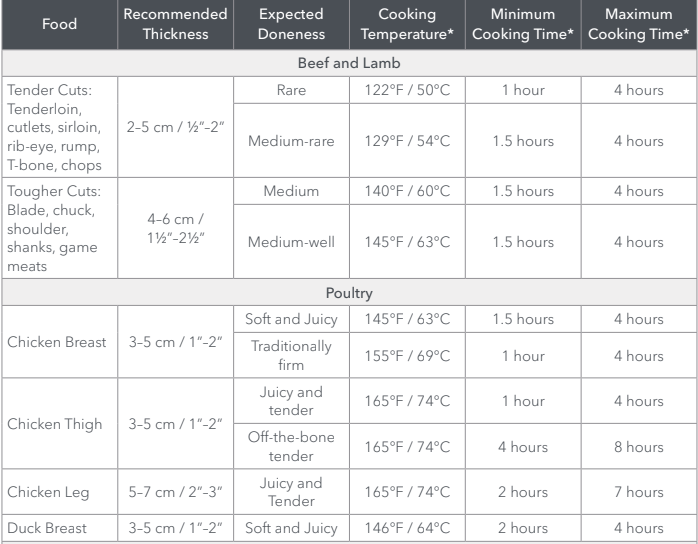

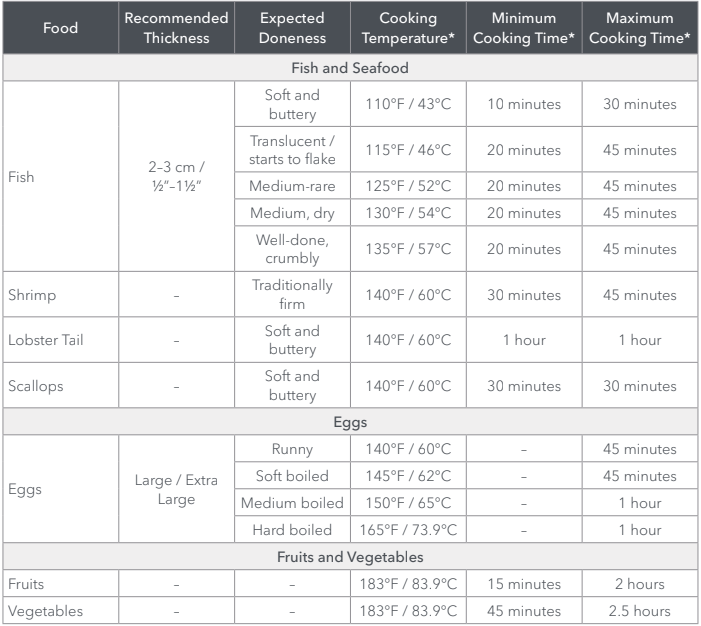
* Cooking times and temperatures are recommendations only. Always refer to a trusted recipe.
CAUTION Always use a meat thermometer to ensure the internal temperature reaches a safe minimum temperature. Refer to the USDA’s Safe Minimum Internal Temperature Chart for more information.
Care and Cleaning
Clean your Duo Nova after each use.
Always unplug your Duo Nova and let it cool to room temperature before cleaning.
Let all surfaces dry thoroughly before use, and before storage.
| Part | Instruction | Cleaning Method |
| Accessories • Steam Rack •Condensation Collector | • Wash after each use. • Never use harsh chemical detergents, powders or scouring pads on accessories. • For dishwasher, place on top rack. • Empty and rinse condensation collector after each use. | Dishwasher Safe* and Hand Washable |
| Lid and Parts • Anti-Block Shield • Sealing Rings • Steam Release Valve • Float Valve • Silicone Cap | • Wash after each use with hot water and mild dish soap and allow to air dry, or place in top rack of dishwasher. • Remove all small parts from lid before washing. • With steam release valve and anti-block shield removed, clean interior of steam release pipe to prevent clogging. • To drain water from the lid after dishwashing, grasp the lid handle and hold the lid vertically over a sink, then turn it 360°— such as turning a steering wheel. • After cleaning, store the lid upside down on the cooker base. • Store sealing rings in a well-ventilated area to decrease residual odor of flavorful meals. To eliminate odors, add 1 cup (8 oz / 250 mL) water and 1 cup (8 oz / 250 mL) white vinegar to inner pot, and run Pressure Cook for 5–10 minutes, then QR pressure. | |
| Inner Pot | • More acute hard water staining may require a vinegar dampened sponge and some scrubbing to remove. • If there is tough or burned food residue at the bottom, soak in hot water for a few hours for easy cleaning. • Wash after each use. • Ensure all exterior surfaces are dry before placing in cooker base. |
*Some discoloration may occur after machine washing, but this will not affect the cooker’s safety or performance.
| Part | Instruction | Cleaning Method |
| Detachable Power Cord (3 and 6 Quart Only) | • Use a barely damp cloth to wipe any particles off power cord. | Damp Cloth Only |
| Cooker Base | • Wipe the inside of the outer pot as well as the condensation rim with a barely damp cloth, and allow to air dry. • Clean cooker base and control panel with a soft, barely damp cloth or sponge. |
| WARNING | |||
| Ensure heating element remains dry at all times. | Do not immerse cooker base in water or attempt to cycle through dishwasher. | Do not submerge power cord at any time. | Do not wet prongs of power cord. |
Troubleshooting
| Problem | Possible Reason | Solution |
| Difficulty closing lid | •Sealing ring not properly installed •Float valve in the popped-up position •Contents in cooker are still hot | •Reposition sealing ring, ensure it is snug behind sealing ring rack. •Gently press the float valve downward with a long utensil. •Turn the steam release handle to the Venting position, then lower lid onto cooker base slowly, allowing heat to dissipate. |
| Difficulty opening lid | •Pressure inside the cooker •Float valve stuck at the popped-up position due to food debris or residue | •Release pressure according to recipe; only open lid after float valve has dropped down. •Ensure steam is completely released by quick releasing pressure, then press float valve gently with a long utensil. Open lid cautiously and thoroughly clean float valve, surrounding area, and lid before next use. |
| DANGER Contents may be under pressure; to avoid scalding injury, do not attempt to force lid open. | ||
| Inner pot is stuck to lid when cooker is opened | Cooling of inner pot may create suction, causing inner pot to adhere to the lid | To release the vacuum, turn the steam release handle to the Venting position to release any pressure. |
| Steam leaks from side of lid | •No sealing ring in lid •Sealing ring damaged or not properly installed • Food debris attached to sealing ring •Lid not closed properly • Sealing ring rack is warped or off center •Inner pot rim may be misshapen | •Install sealing ring. •Replace sealing ring. •Remove sealing ring and clean thoroughly. •Open, then close lid. • Remove sealing ring from lid, check sealing ring rack for bends or warps. Contact Customer Care. •Check for deformation and contact Customer Care. |
| Problem | Possible Reason | Solution |
| Float valve does not rise | •Food debris on float valve or float valve silicone cap •Too little liquid in the inner pot •Float valve silicone cap damaged or missing •Float valve obstructed by lid-locking mechanism •No heat in the inner pot •Inner pot base may be damaged | •Remove float valve from lid and clean thoroughly; perform Initial Test Run to check for function and record findings. Contact Customer Care. •Check for scorching on bottom of inner pot. Add thin, water-based liquid to the inner pot according to its size: 3 Quart: 1 cup (8 oz / 250 mL) 6 Quart: 1 1/2 cups (12 oz / 375 mL) 8 Quart: 2 cups (16 oz / 500 mL) 10 Quart: 2 1/2 cups (20 oz / 625 mL) •Install or replace float valve. •Tap float valve with a long utensil. If the float valve does not drop, turn the cooker off. Contact Customer Care. •Perform Initial Test Run to check for function and record findings. Contact Customer Care. •Perform Initial Test Run to check for function and record findings. Contact Customer Care. |
| Minor steam leaking/hissing from steam release valve during cook cycle | •Steam release handle not in Sealing position. •Cooker is regulating excess pressure | •Turn the steam release handle to the Sealing position. •This is normal; no action required. |
| Steam gushes from steam release valve when quick release button is in Seal position | •Not enough liquid in the inner pot •Pressure sensor control failure •Steam release valve not seated properly | •Add thin, water-based liquid to the inner pot according to its size: 3 Quart: 1 cup (8 oz / 250 mL) 6 Quart: 1 1/2 cups (12 oz / 375 mL) 8 Quart: 2 cups (16 oz / 500 mL) 10 Quart: 2 1/2 cups (20 oz / 625 mL) •Contact Customer Care. •Turn steam release handle to ensure it is in the Sealing position. |
| Display remains blank after connecting the power cord | •Bad power connection or no power •Cooker’s electrical fuse has blown | •Inspect power cord for damage. If damage is noticed, contact Customer Care. Check outlet to ensure it is powered. •Contact Customer Care. |
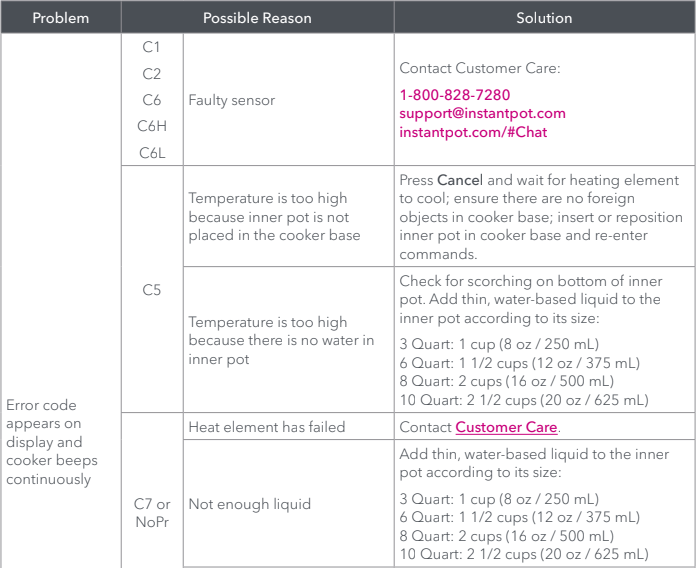
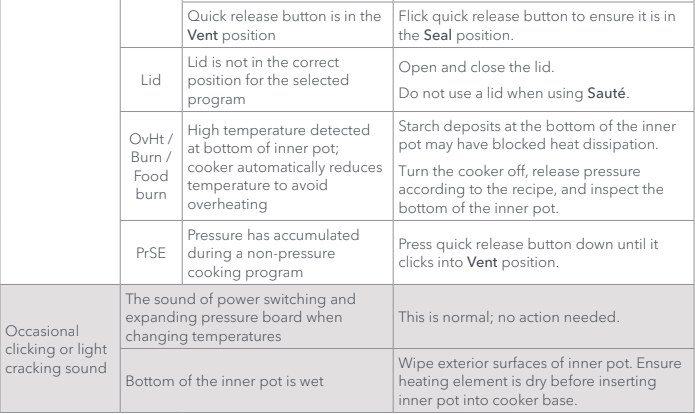
Warranty
Limited Warranty
This Limited Warranty is effective for one year from the date of original consumer purchase. Proof of original purchase date and, if requested by an authorized representative of Instant Brands Inc. (“Instant Brands”), return of your appliance, is required to obtain service under this Limited Warranty. Provided that this appliance is operated and maintained in accordance with written instructions attached to or furnished with the appliance, Instant Brands will, in its sole and
exclusive discretion, either: (i) repair defects in materials or workmanship; or (ii) replace the appliance. In the event that your appliance is replaced, the Limited Warranty on the replacement appliance will expire 12 months from the date of original consumer purchase.
This Limited Warranty extends only to the original purchaser and use of the appliance in the United States of America and Canada. This warranty does not cover units that are used outside of the United States of America and Canada.
Any modification or attempted modification to your appliance may interfere with the safe operation of the appliance and will void this Limited Warranty. This Limited Warranty does not apply in respect of any appliance or any part thereof that has been altered or modified unless such alterations or modifications were expressly authorized by an Instant Brands representative.
Limitation and Exclusions
The liability of Instant Brands, if any, for any allegedly defective appliance or part shall in no circumstances exceed the purchase price of a comparable replacement appliance.
This Limited Warranty does not cover:
- Damage resulting from accident, alteration, misuse, abuse, neglect, unreasonable use, use contrary to the operating instructions, normal wear and tear, commercial use, improper assembly, disassembly, failure to provide reasonable and necessary maintenance, fire, flood, acts of God or repair by anyone unless directed by an Instant Brands Representative;
- Repairs where your appliance is used for other than normal, personal use or when it is used in a manner that is contrary to published user or operator instructions; or
- Use of unauthorized parts and accessories, or repairs to parts and systems resulting from unauthorized repairs or modifications made to this appliance.
The cost of repair or replacement under these excluded circumstances shall be paid by you.
Disclaimer of Implied Warranties
EXCEPT AS EXPRESSLY PROVIDED HEREIN AND TO THE EXTENT PERMITTED BY LAW, INSTANT BRANDS MAKES NO WARRANTIES, CONDITIONS OR REPRESENTATIONS, EXPRESS OR IMPLIED, BY STATUTE, USAGE, CUSTOM OF TRADE OR OTHERWISE WITH RESPECT TO THE APPLIANCES OR PARTS COVERED BY THIS WARRANTY, INCLUDING BUT NOT LIMITED TO, WARRANTIES, CONDITIONS, OR REPRESENTATIONS OF WORKMANSHIP, MERCHANTABILITY, MERCHANTABLE QUALITY, FITNESS FOR A PARTICULAR PURPOSE OR DURABILITY.
Some states or provinces do not allow for the exclusion of implied warranties of merchantability or fitness, so this limitation may not apply to you. In these states and provinces, you have only the implied warranties that are expressly required to be provided in accordance with applicable law.
Limitation of Remedies; Exclusion of Incidental and Consequential Damage
YOUR SOLE AND EXCLUSIVE REMEDY UNDER THIS LIMITED WARRANTY SHALL BE APPLIANCE REPAIR OR REPLACEMENT AS PROVIDED HEREIN. INSTANT BRANDS SHALL NOT BE LIABLE FOR INDIRECT, INCIDENTAL OR CONSEQUENTIAL DAMAGES ARISING OUT OF OR IN CONNECTION WITH THE USE OR PERFORMANCE OF THE APPLIANCE OR DAMAGES WITH RESPECT TO ANY ECONOMIC LOSS, PERSONAL INJURY, LOSS OF PROPERTY, LOSS OF REVENUES OR PROFITS, LOSS OF ENJOYMENT OR USE, COSTS OF REMOVAL, INSTALLATION OR OTHER INDIRECT, INCIDENTAL OR CONSEQUENTIAL DAMAGES OF ANY NATURE OR KIND.
You can download the PDF version of the Instant Pot DUO SVTM 6 Quart Multi-Use Pressure Cooker User Manual here.
